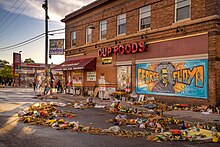| Revision as of 09:55, 24 April 2021 editMinnemeeples (talk | contribs)Extended confirmed users10,312 edits →External links: CategoriesTag: Reverted← Previous edit | Revision as of 10:05, 24 April 2021 edit undoBagumba (talk | contribs)Autopatrolled, Administrators174,770 edits ce hatnoteTag: RevertedNext edit → | ||
| Line 1: | Line 1: | ||
| {{Not to be confused with|Cub Foods}} |
{{Not to be confused with|text=the American supermarket chain ]}} | ||
| {{Infobox retail market | |||
| | retail_market_name = Cup Foods | | retail_market_name = Cup Foods | ||
| | image = Cup_Foods_(50067052177).jpg | | image = Cup_Foods_(50067052177).jpg | ||
Revision as of 10:05, 24 April 2021
Not to be confused with the American supermarket chain Cub Foods. Cup Foods, June 24, 2020 Cup Foods, June 24, 2020 | |
| Location | Minneapolis, Minnesota, United States |
|---|---|
| Coordinates | 44°56′04″N 93°15′45″W / 44.93433°N 93.26244°W / 44.93433; -93.26244 |
| Address | 38th and Chicago |
| Opening date | 1989 |
| Website | Official website |
Cup Foods is a retail market store and restaurant in Minneapolis, Minnesota, United States that is located at the intersection of East 38th Street and Chicago Avenue. The store's origin in the south Minneapolis area dates back to 1989. It drew controversy over the ensuring decades for being the location of illicit activities and police surveillance. On May 25, 2020, George Floyd made a purchase there with a counterfeit $20 bill, resulting in his murder while under police custody and initiating a global protest movement about police brutality.
History
Retail market
The Cup Foods first opened in 1989 as a a combination grocery store, convenience store, and restaurant in the Powderhorn community in Minneapolis. The store, owned by a Palestinian-American family, became a fixture in the neighborhood for the ensuing decades. The area around the store had also been the location of violent crime, illicit drug dealing, loitering, and undercover police surveillance since the 1990s.
In 2000, the city temporarily shut the store down for several months after recovering stolen electronics, ammunition, and materials for illicit drugs inside Cup Foods–leading to a constant police presence around the property. For many of the store's customers in the neighborhood, it provided fresh produce, prepared food, and commodities such as cigarettes and pre-paid cellphone minutes.
Murder of George Floyd
On May 25, 2020, a 9-1-1 call from an employee at Cup Foods led to the fatal encounter between George Floyd and the Minneapolis police. The employee reported that Floyd had paid using what he believed to be a counterfeit $20 bill. Chauvin and three other police officers arrived in response, and they arrested and detained Floyd. During the arrest, Chauvin pinned Floyd by his neck on the ground for 9 minutes and 29 seconds while as he struggled to breathe and died. Several bystanders attempted to intervene unsuccessfully, but several capture video footage on their cellphones.
Though Floyd had lived 20 minutes away from the store in the nearby suburb of St. Louis Park, he was a frequent customer there. Videos and images of Floyd's death outside the store linked it to the protest movement of racial injustice in the United States that soon followed. Floyd's death also led to further scrutiny of the store and its relationship with the Minneapolis police and its off-duty police officers who were known to provide paid security services.
Closure and re-opening
Cup Foods closed temporarily during the George Floyd protests in Minneapolis–Saint Paul and resulting unrest in mid 2020. Protesters, who blocked off the surrounding streets, transformed the 38th and Chicago street intersection into an occupation protest. The intersection, which they held as George Floyd Square, was adorned with public art and memorials to Floyd. When the store eventually re-opened in August of that year, some protesters demanded that the store remain closed for continued community mourning over Floyd's death and confronted store owners who vowed to keep the store open anyway. Some activities circulated petitions to permanently close the store.
Ownership and namesake
Cup Foods was founded by Samir Abumayyaleh, who was born in Palestine and emigrated to the United States as a child.
The name of the store was originally Chicago Unbeatable Prices, but later shortened to CUP.
See also
References
- ^ Bogel-Burroughs, Nicholas and Healy, Jack (15 June 2020). "Cup Foods, a Minneapolis Corner Store Forever Tied to the Death of George Floyd". New York Times. Retrieved 17 June 2020.
- ^ Sidner, Sara (2021-04-10). "Inside Cup Foods, where it seems George Floyd never left". CNN. Retrieved 2021-04-10.
- ^ Pruni, Analise (12 August 2020). "CUP Foods: Good neighbor or bad?". Minnesota Spokesman-Recorder.
- Forliti, Amy; Karnowski, Steve; Webber, Tammy (April 5, 2021). "Police chief: Kneeling on Floyd's neck violated policy". Star Tribune. Associated Press. Retrieved April 8, 2021.
- Levenson, Eric (March 29, 2021). "Former officer knelt on George Floyd for 9 minutes and 29 seconds -- not the infamous 8:46". CNN. Archived from the original on March 29, 2021. Retrieved March 29, 2021.
- McGreal, Chris (April 20, 2021). "Derek Chauvin found guilty of George Floyd's murder". The Guardian. Retrieved April 20, 2021.
- "George Floyd: What happened in the final moments of his life". BBC News. May 30, 2020. Archived from the original on June 5, 2020. Retrieved June 1, 2020.
- "38th Street and Chicago Avenue". City of Minneapolis. 2020-11-12. Retrieved 2020-11-25.
- Sandberg, Diane; Edwards, Kiya (2020-08-17). "Talks continue on reopening 38th and Chicago in Mpls". KARE 11. Retrieved 2020-11-25.
- Burks, Megan; Nguyen, Christine T.; Frost, Evan (2020-11-25). "The call for justice at 38th and Chicago persists". Minnesota Public Radio. Retrieved 2020-11-25.
- Otárola, Miguel (4 August 2020). "Cup Foods, site where George Floyd was killed, reopens in south Minneapolis". Star Tribune.
- ^ Ismail, Aymann (2020-10-06). "The Store That Called the Cops on George Floyd Is Facing a Painful Reckoning". Slate Magazine. Retrieved 2021-04-24.